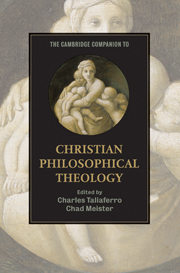12 - Church
from Part II - God in relation to creation
Published online by Cambridge University Press: 28 May 2010
Summary
Theologians are relatively secure on what counts as relevant topics in ecclesiology; they pursue questions relative to the identity, nature, structures, ministry, sacraments, and mission of the church. It is much less clear what role philosophers should have in this domain. This may arise because the kind of intellectual tools and skills deployed by philosophers simply do not have traction when applied to issues in ecclesiology; the questions that show up in ecclesiology are such that they are not susceptible to philosophical analysis. There is, however, a more likely explanation. Modern philosophy of religion has focused on generic theism. There has not as yet been a systematic exploration of the philosophical dimensions of the whole range of topics that exercises the Christian theologian. This omission may be well and good in philosophy of religion, but it cannot be allowed to stand as the default position in philosophical theology. In the latter instance, the preliminary starting point surely must be that no topic in Christian theology should be off limits to philosophical investigation. Only time can tell whether philosophical reflection on the church can yield the kind of insight that is common, say, on the Trinity or atonement. In this chapter, I focus on conceptual and epistemological dimensions of ecclesiology. I end by sketching the kind of tasks that are likely to detain the philosopher.
- Type
- Chapter
- Information
- The Cambridge Companion to Christian Philosophical Theology , pp. 170 - 182Publisher: Cambridge University PressPrint publication year: 2009
- 1
- Cited by

